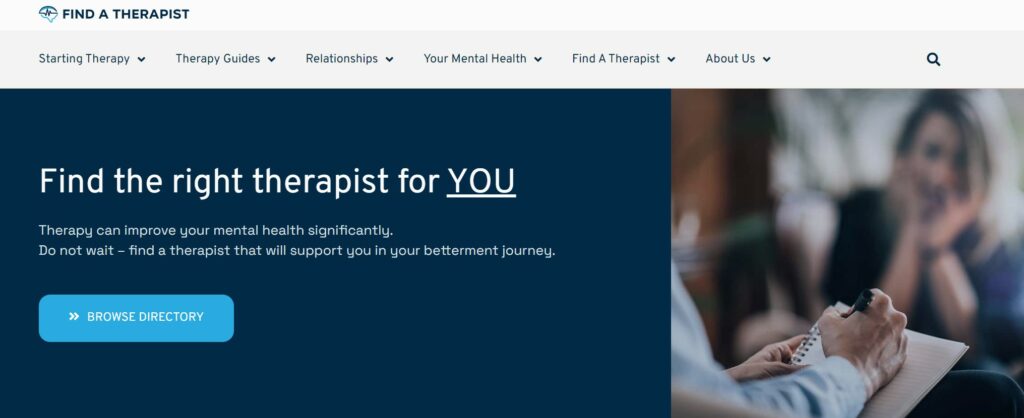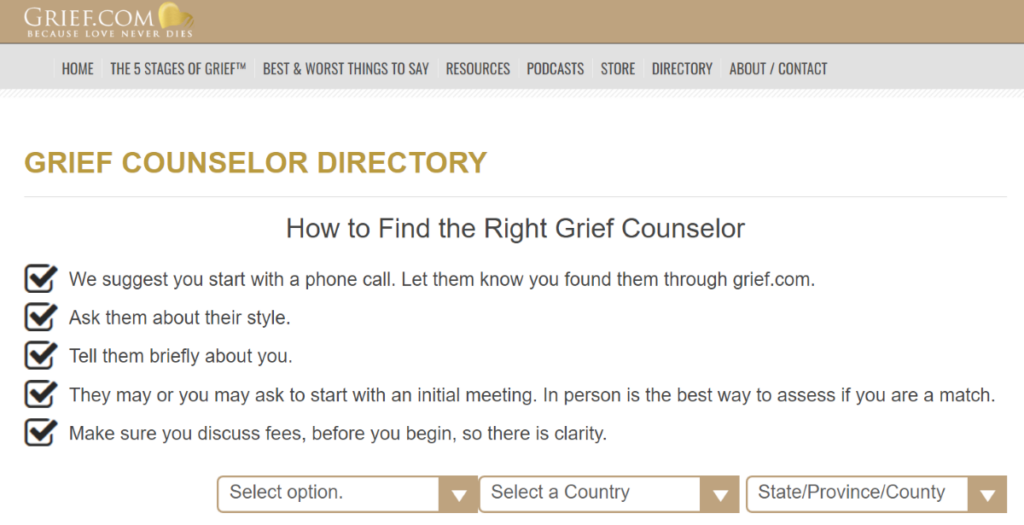Everyone experiences loss at one point or another, and even though it’s a natural part of life, grief can cause tremendous stress and impair your ability to function. If you’ve lost a loved one, you might feel the need to talk to someone to help process the intense emotions you’re feeling.
In this article, we’ve looked at five platforms that can connect you with a grief counselor, online or in person. We’ve also looked at how grief therapy works and the most common techniques used in grief counseling.
Want to skip right to the suggestions for grief counseling? Here are our 5 recommended therapy solutions:
Grief Counseling Near Me
Below, we’ve looked at five services you can use to connect with a counselor experienced in supporting people through their grieving process.
| Provider | Good For | Location | Pricing |
|---|---|---|---|
| BetterHelp | Quick match with the right therapist four you | Online therapy | $65 to $90 per week (billed every 4 weeks) |
| Find-a-therapist.com | Finding and contacting the right therapist for you | Online and in-person therapy | Varies depending on the counselor fee |
| Calmerry | Depression therapy, online grief counseling, anxiety therapy, therapy for OCD, self-esteem therapy, LGBT-friendly therapy | Online therapy | $49.50 to $73.75 per week (billed monthly) |
| TalkSpace | Depression, anxiety, bipolar disorder, OCD, PTSD, LGBTQIA+ therapy | Online therapy | Varies according to insurance coverage or self-pay options |
| Grief.com | Finding a grief counselor near you | Online and in-person therapy worldwide | Varies depending on the counselor fee |
1. BetterHelp

Explore emotional well-being with BetterHelp – your partner in affordable online therapy. With 30,000+ licensed therapists and plans starting from only $65 per week, BetterHelp makes self-care accessible to all. Complete the questionnaire to match with the right therapist.
- Good for: Quick match with the right therapist four you.
- Location: Online therapy.
- Pricing: $65 to $90 per week (billed every 4 weeks).
- Features: iOS and Android app available, message your therapist anytime, live sessions are scheduled weekly and done via live chat, phone, or video call.
BetterHelp is an online therapy platform that provides services to those in need of counseling, including grief counseling. The qualified grief counselors on BetterHelp provide support and understanding to anyone dealing with loss, grief, and its accompanying emotions.
Read our BetterHelp review here.
2. Find-a-therapist.com

- Good for: Finding and contacting the right therapist for you.
- Location: Online and in-person therapy.
- Pricing: Varies depending on the counselor fee.
- Features: Filter your search, find accessible and effective online and in-person therapy, find guides on different types of therapy.
Find-a-therapist.com gives you access to a list of licensed therapists with experience in grief counseling, such as Lincoln Stoller, Tami Hubbard, or Jarely Galeas. You can review the profile of each therapist and contact them directly.
3. Calmerry

Embark on a journey of mental wellness with Calmerry. With diverse subscription options, starting at just $50, Calmerry makes prioritizing your mental health simple and accessible. You can message your therapist any day or schedule a live therapy session from the comfort of your home from any device.
- Good for: Depression therapy, online grief counseling, anxiety therapy, therapy for OCD, self-esteem therapy, LGBT-friendly therapy.
- Location: Online therapy.
- Pricing: $49.50 to $73.75 per week (billed monthly).
- Features: Message to your counselor anytime, text therapy and video therapy according to the plan you choose, free counselor switching.
To find a grief counselor in Calmerry you must fill out a questionnaire where you can specify which are the areas you want to work in therapy. Then, you will be matched with the right therapist for you according to your answers.
Read our comparison between Calmerry and BetterHelp here.
4. TalkSpace

Tailored to individuals, couples, teens, and offering psychiatry services, Talkspace plans kick off at a wallet-friendly $69 per week. What’s more, many health insurances also cover their services, enhancing accessibility and affordability. Complete a questionnaire and get matched with the right therapist for you.
- Good for: Depression, anxiety, bipolar disorder, OCD, PTSD, LGBTQIA+ therapy.
- Location: Online therapy.
- Pricing: Varies according to insurance coverage or self-pay options.
- Features: Accepts insurance, pick your therapist from a list of recommendations, live video sessions and unlimited messaging with your therapist, medication management.
TalkSpace offers you a list of therapists, including grief counselors, according to your needs and preferences. You can choose the one you feel is a right fit for you and start your therapy process.
Read our TalkSpace review here.
5. Grief.com

- Good for: Finding a grief counselor near you.
- Location: Online and in-person therapy worldwide.
- Pricing: Varies depending on the counselor fee.
- Features: Online directory, lists the therapists’ contact information, address, and credentials, contact the therapist you choose directly.
Grief.com is an online directory that helps you search for a grief counselor near you. You can find professionals who provide grief counseling near you by selecting your country and state, province, or county.
Online vs. Face-to-face Grief Counseling

When choosing between online and face-to-face therapy, there are many different factors to consider.
One of the most significant benefits of online counseling is its practicality and convenience. This type of counseling allows you to attend therapy from the comfort of your own home.
Losing a loved one is not only devastating emotionally and psychologically but also demanding on a practical level. The time immediately after the loss can be hectic, especially when including funeral arrangements and all other tasks that need to be handled to give your loved one a proper goodbye.
If you have lost a family member, the roles within the family and the dynamics of the family might change. For example, if you’ve lost your partner, you might find yourself with too many additional tasks to handle while you’re still grieving.
Online therapy can be useful if you feel like you have no time for counseling. Furthermore, if you’ve lost a family member, you might not want to burden those around you. Online therapy is discrete; you can talk to a therapist outside of business hours if you’d prefer.
Also, some people might find it easier to open up with a therapist online. However, this varies from person to person – you may also feel more comfortable speaking with a grief counselor face-to-face.
You may also find that attending in-person counseling is more straightforward in that no technical complexities are involved, such as having a good internet connection. This is especially true if you live somewhere with many good-quality counselors available nearby, meaning you don’t need to travel far to find a qualified grief counselor.
Also, some types of therapies, such as art therapy, which is particularly useful in grief counseling, cannot be conducted online.
How Does Grief Counseling Help?
Grief counseling deals with feelings of grief, utilizes strategies to cope better and accept the loss of a loved one, and helps you adapt to life without your friend or family member.
Loss is a natural part of life, and all the accompanying emotions, albeit sometimes confusing and difficult to understand, are completely natural and necessary.
Even though people around us want to help in these situations, they don’t always know the right thing to say, or they might even be affected by the same loss, making them unable to provide proper support because they’re in the same situation.
In these instances, talking to a licensed professional with experience helping bereaved people can greatly help.
If you’re experiencing physical or behavioral symptoms of grief, such as loss of appetite, trouble sleeping, or even prolonged physical pain, it might be worth looking into grief therapy. In the case of physical symptoms, you should seek help from your doctor, and they’ll refer you to someone who can provide in-person support.
Even though there aren’t that many differences between regular grief counseling and grief therapy, grief therapy deals with more pervasive symptoms of bereavement, especially those that hinder you from functioning in your everyday life.
Types of Grief Therapy

Below, we’ve looked at different types of grief therapies available to people experiencing prolonged and intense grief.
Complicated Grief Therapy
In the normal process of grieving, grief and all accompanying emotions subside over time, acceptance slowly occurs, and people eventually adapt to their new lives, without the person they’ve lost.
Complicated grief or complicated bereavement disorder can occur in people whose grief doesn’t fade over time, and instead negatively affects their everyday lives.
To diagnose complicated grief, the grief and accompanying emotions must be as strong as in the beginning, and the loss must have happened at least six months ago.
Some of the symptoms of complicated grief are:
- Intrusive thoughts about the deceased person
- Obsessive thinking about the loss
- Inability to accept that the loss occurred
- Feeling a loss of purpose
- Suicidal thoughts
- Avoiding reminders of the loss
Some behavioral and physical symptoms might occur too, such as insomnia, loss of appetite, headaches, and a weakened immune system.
If you suspect you might be experiencing complicated grief, it would be best to look for a complicated grief therapist or seek help from your doctor, especially if you are suffering from physical symptoms.
Traumatic Grief Therapy
Traumatic grief therapy is a particular type of grief counseling that not only helps grieving people but also helps with recovery from traumatic events.
Some people might have witnessed the death of their loved one, or the death happened so suddenly and unexpectedly that it qualifies as a traumatic event. In these cases, the grieving person must deal with both trauma and grief.
Traumatic grief therapy is tailored to treat your trauma response and help with the grieving process.
The first step in traumatic grief therapy is stabilizing and processing the trauma. Only after the traumatic experience is resolved will your therapist begin to address the grief and loss.
Techniques Used in Grief Counseling

There are a number of different psychotherapeutic techniques commonly used in grief counseling.
Acceptance and Commitment Therapy (ACT)
Acceptance and Commitment Therapy is a form of psychotherapy that helps you accept negative feelings and commit to healthier, more constructive activities.
The intervention under consideration is a psychological approach that is grounded on empirical evidence.
It incorporates acceptance and mindfulness techniques, with commitment and behavior-change tactics, with the aim of enhancing psychological flexibility. [source 1]
This therapeutic approach teaches you to embrace your feelings when they’re helpful and put them aside when they’re not.
When applied in grief counseling, this approach can help the grieving person to accept their emotions, no matter how difficult or confusing. It can also help you to accept the loss you’ve faced and adjust to life without a loved one.
This approach can be especially useful when dealing with complicated or prolonged grief.
Cognitive-Behavioral Therapy (CBT)
CBT has been the subject of a substantial number of research investigations, all of which point to its ability to significantly enhance both functioning and quality of life. CBT is one of the most effective therapeutic approaches in general, which can also be helpful when dealing with grief.
The core principle of Cognitive-Behavioral Therapy is identifying negative thought patterns, and unhelpful behavior and learning how to cope with them. [source 2]
Cognitive-behavioral therapists believe our thought patterns affect our behavior, affecting our thoughts, and capture us in a vicious cycle. CBT professionals help to address both thoughts, beliefs and behaviors, work to change them and establish healthier patterns in their place.
When dealing with grief, negative thought patterns can affect our behavior, which then stands in the way of healing, accepting, and moving on.
It is assumed that emotions, behaviors, and bodily sensations are influenced by the cognitive processing of events and may therefore be modified or rebuilt in order to cope with grief. [source 3]
Art Therapy

Art therapy is the type of therapy that relies on the idea that some emotions are too difficult to express with words. Instead, these thoughts come out in their truest form when expressed through creativity.
Art therapy has been shown to have positive effects on several aspects of human functioning. These include improvements in cognitive and sensorimotor abilities, as well as enhancements in self-esteem, self-awareness, emotional resilience, introspection, social skills, conflict resolution, and even broader societal and ecological transformations.
If you’ve lost a loved one, you might find it overwhelming to talk about the experience, or you might lack the right words to express your grief. In art therapy, you might draw, paint, or use other creative means to express your emotions, helping to promote emotional healing.
Art therapy exercises include several techniques, one of which involves the use of writing and drawing as a means to construct trauma narratives.
The many forms of written expression that may be used for personal reflection and introspection include epitaphs, acrostic poems, unfinished sentences/writing prompts, life imprints, journaling, bibliotherapy and creative writing, and letter writing.
Group Therapy
Group therapy typically consists of a cohort of between five to 15 patients, led by one or more psychologists. In general, it is customary for groups to convene on a weekly basis, with each session lasting around one to two hours.
Certain individuals choose to engage in individual counseling with group therapy, whilst others just participate in group therapy
If you’ve lost a loved one, you might feel like the people surrounding you don’t understand you, or you might not want to burden them with the thoughts you’re experiencing.
Group therapies are one of the best ways to meet people going through the same thing as you. They can offer understanding, support, and advice.
These therapy sessions are mediated by a licensed professional who knows which subjects to address while allowing every participant enough time to talk freely about their thoughts and feelings.
Grief Counseling Certifications and Licensing

A qualified grief counselor has the credentials to provide this therapy treatment. Some of these mental health professionals are certified in grief counseling specifically, while others offer a broader range of counseling services, including helping people overcome grief.
All grief counselors must have a master’s degree in social sciences, psychology, nursing, or behavioral sciences, in most states. They must then become licensed in their state, having passed the required exams, and completed a given number of practical counseling hours under supervision.
After obtaining the proper education, some professionals choose to finish additional training and pass competence exams to become a Certified Grief Counselor (CGC).
To keep their license, Certified Grief Counselors must practice grief counseling and must renew their qualifications every four years.
It’s not strictly necessary to seek out a CGC to help overcome bereavement. However, these types of counselors specialize specifically in helping grieving people and families, which can be quite helpful for those seeking this type of support.
Conclusion
The process of grieving can be stressful and demanding, especially if you feel like there’s no one to talk to and no one who truly understands what you’re going through. Finding the right counselor to help you deal with the grieving process is a crucial step towards moving on.
If you have any questions or you’re still not sure how to find the right grief counselor, contact us and we’ll get back to you.
References
Source 1: Dixon, M. R., Hayes, S. C., & Belisle, J. (2024). Acceptance and commitment therapy for behavior analysts: A practice guide from theory to treatment. Taylor & Francis.
Source 2: Bufka, L. F., Wright, C. V. E., & Halfond, R. W. (2020). Casebook to the APA Clinical Practice Guideline for the treatment of PTSD (pp. xi-256). American Psychological Association.
Source 3: Malkinson, R. (2010). Cognitive-behavioral grief therapy: The ABC model of rational-emotion behavior therapy. Psihologijske teme, 19(2), 289-305.





